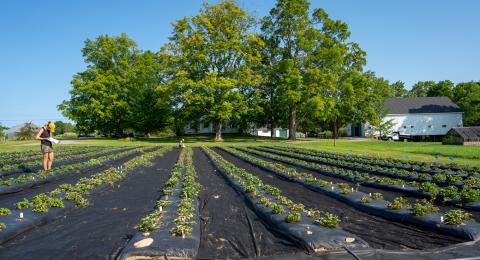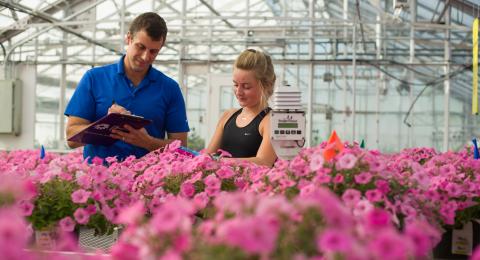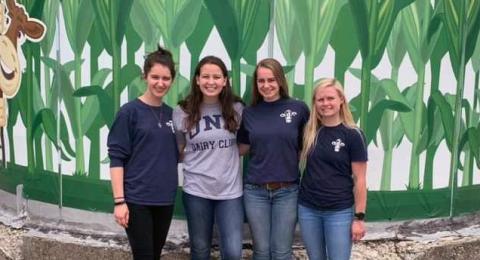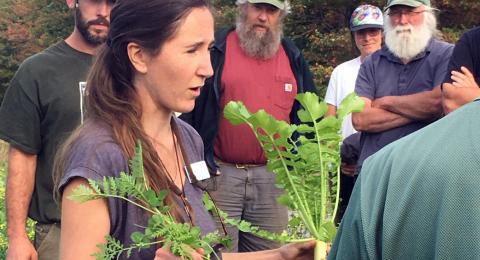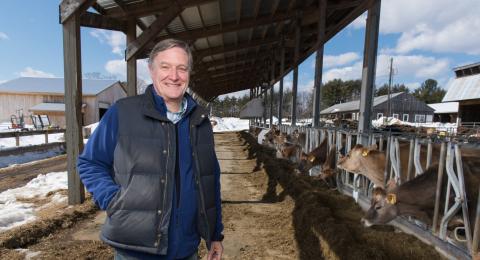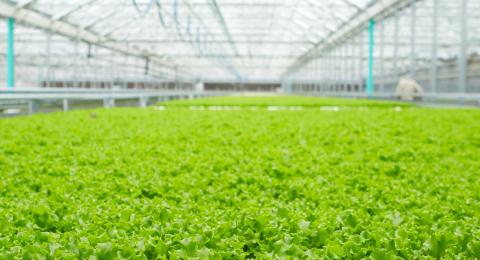
Since its establishment in 1887, the New Hampshire Agricultural Experiment Station (NHAES) has pioneered innovative research, nurturing sustainable solutions for agricultural, food, and environmental challenges, enriching every corner of the Granite State. Through pioneering interdisciplinary initiatives and state-of-the-art facilities, NHAES remains dedicated to propelling positive change, empowering communities not only within New Hampshire but also beyond its borders. Below, you'll discover news and information about just some of the NHAES research that has had wide-ranging impacts on agriculture and food production; natural resources protection and conservation; and nutrition, health and wellness across the Granite State and throughout the Northeast.
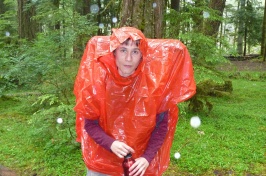 Wednesday, May 01, 2024Assistant professor reflects on her love of plants and the outdoors, growing up in Washington state, and how she learned to love living somewhere other than the Pacific NorthwestAnna O’Brien, assistant professor in the department of molecular, cellular, and biomedical sciences, joined the UNH College of Life Sciences and Agriculture in March 2022, bringing her deeply inquisitive energy, commitment to work that benefits both the planet and its inhabitants, and love of bright colors to the college. Her research seeks to understand how microbiomes affect the ability of...
Wednesday, May 01, 2024Assistant professor reflects on her love of plants and the outdoors, growing up in Washington state, and how she learned to love living somewhere other than the Pacific NorthwestAnna O’Brien, assistant professor in the department of molecular, cellular, and biomedical sciences, joined the UNH College of Life Sciences and Agriculture in March 2022, bringing her deeply inquisitive energy, commitment to work that benefits both the planet and its inhabitants, and love of bright colors to the college. Her research seeks to understand how microbiomes affect the ability of... Tuesday, April 23, 2024New research examines the effects of a plant-based feed additive on organic dairy cow methane emissions, as well as milk composition and quantityKey Research Finding Supplementing Agolin Naturu, a blend of essential oils in the diet of organic dairy cows improves feed efficiency and reduces methane, which is produced through belching following enteric fermentation (a digestive process that occurs in the rumen, or the largest compartment of the cow’s stomach). Agolin has the additional benefit of increasing the production of milk...
Tuesday, April 23, 2024New research examines the effects of a plant-based feed additive on organic dairy cow methane emissions, as well as milk composition and quantityKey Research Finding Supplementing Agolin Naturu, a blend of essential oils in the diet of organic dairy cows improves feed efficiency and reduces methane, which is produced through belching following enteric fermentation (a digestive process that occurs in the rumen, or the largest compartment of the cow’s stomach). Agolin has the additional benefit of increasing the production of milk... Thursday, April 18, 2024UNH research is developing non-invasive bioacoustic methods to track and characterize New Hampshire’s moose populationKey Research Finding By analyzing online videos of moose vocalizations, researchers quantified moose calls and determined significant differences in calls by sex and age. Key Terms Passive acoustic monitoring: The tracking and monitoring of animals and environments through recording sounds. Kloepper has previously used passive acoustic monitoring to estimate bat colony sizes and frog...
Thursday, April 18, 2024UNH research is developing non-invasive bioacoustic methods to track and characterize New Hampshire’s moose populationKey Research Finding By analyzing online videos of moose vocalizations, researchers quantified moose calls and determined significant differences in calls by sex and age. Key Terms Passive acoustic monitoring: The tracking and monitoring of animals and environments through recording sounds. Kloepper has previously used passive acoustic monitoring to estimate bat colony sizes and frog...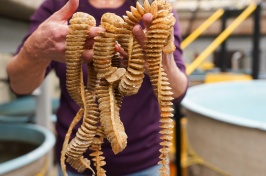 Wednesday, April 17, 2024UNH research examines the impact of rising water temperatures on channeled whelk reproductionAt the University of New Hampshire’s Coastal Marine Laboratory (CML), research associate professor Elizabeth Fairchild is investigating how the changing temperature of coastal marine waters off Massachusetts might be impacting the number of offspring produced by an aquatic species that’s part of one of the region’s most valuable – yet lesser known – fisheries: Channeled whelk (Busycotypus...
Wednesday, April 17, 2024UNH research examines the impact of rising water temperatures on channeled whelk reproductionAt the University of New Hampshire’s Coastal Marine Laboratory (CML), research associate professor Elizabeth Fairchild is investigating how the changing temperature of coastal marine waters off Massachusetts might be impacting the number of offspring produced by an aquatic species that’s part of one of the region’s most valuable – yet lesser known – fisheries: Channeled whelk (Busycotypus...
Upcoming COLSA & NHAES Events
There are no items to display.
See all upcoming COLSA events